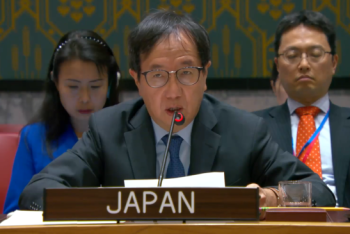国連平和活動の縮小が加速する文脈における女性・平和・安全保障(WPS)コミットメントの維持に関する安保理ブリーフィングにおける山﨑大使ステートメント
令和6年8月7日

(as delivered)
Thank you, Madam President.
I also welcome your presence in this Council, and I thank Sierra Leone for convening this important briefing focusing on sustaining WPS Commitments in the context of accelerated transition of peace operations. I also appreciate Ms. Bahous, Ms. Pobee and Ms. Khair for their comprehensive briefings.
The Security Council has mandated United Nations field missions to prevent and respond to conflict related sexual violence (CRSV) and to establish monitoring, analysis and reporting arrangements. It is important that, when drawdowns and the exit of peace operations are accelerated, the Council develops more advanced and holistic transition planning for such missions to allow tasks related to sexual and gender-based violence (SGBV) and CRSV to be properly taken over. This is to prevent negative impact on the implementation of the WPS agenda.
Madam President,
I would like to make three recommendations in this regard.
First, in order to best support sustainable UN mission transitions, sufficient time should be ensured to transfer tasks to the host government, the UN Country Team and civil society organizations. Accordingly, peace operations should engage with non-mission stakeholders from the time of normal UN peace operations.
Furthermore, activities towards a smooth transition should be guided by gender-responsive conflict analysis and take into account the needs of women and girls.
Second, the entire international community should work together with the UN Country Team and other stakeholders in order to secure women’s leadership and agency. They should also prioritize ensuring civic space in the advancement of women’s full, equal, meaningful and safe participation in politics, peacebuilding and other processes during and after the transition process. This includes building the capacity of women leaders and institutions.
As you recall, in March, during its Presidency, Japan held the open debate entitled "Promoting Conflict Prevention - Empowering All Actors, Including Women and Youth", followed by the press stakeout attended by sixty-seven countries jointly committing to prevention and sustainable peacebuilding which necessitates a comprehensive approach engaging all members of society, including women.
In the debate, Japan reiterated that women should be included in all stages of peacekeeping operations, including transitions, and in all preventive activities at the national, regional, and international levels. In this vein, we would like to recall that resolution 2594 requests the Secretary-General to ensure women’s needs are fully integrated in all prioritized and sequenced stages of mission mandates and mission transitions.
Third, to prevent a sharp drop in funding and interventions on gender equality and the WPS agenda after the departure of a UN mission, a transition plan should be developed in advance. This plan should ensure women’s participation, which will contribute to preventing a reversion to conflict after the mission’s withdrawal. As we learnt from the aforementioned Council’s open debate, the WPS perspective should be incorporated into the mission’s activities from the time of its deployment. The Security Council should encourage missions to cooperate with all actors, including other UN agencies that will remain in the country after the withdrawal of the mission, and call on them to implement the WPS agenda.
I remind the Council that the Peacebuilding Commission (PBC) has a good history of holding meetings on countries in mission transition, as well as on WPS, as the PBC convenes all stakeholders to discuss how to further the support to these countries and to submit useful advice to the Security Council.
Madam President,
In conclusion, Japan reaffirms its commitment to the WPS agenda and the prevention of SGBV and CRSV throughout peace processes.
Thank you.
